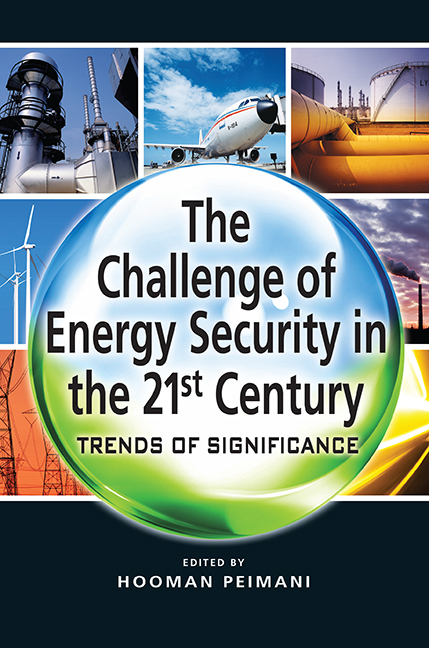Book contents
- Frontmatter
- Dedication
- Contents
- List of Tables and Figures
- List of Maps
- List of Acronyms
- Acknowledgements
- About the Contributors
- INTRODUCTION
- Global Trends in Renewable Electricity, Renewable Fuels, and Markets for Renewable Heating and Cooling
- Resource Mutualism or Codependence? The Water-Energy Nexus in Asia
- OPEC's Long-Term Role in Affecting Energy Security
- Whither a Gas OPEC? Not in the Pipeline
- Shared Interests or Competing Actions: What Drives Energy Security Cooperation between Asia and Europe?
- CONCLUSION
- Index
INTRODUCTION
Published online by Cambridge University Press: 21 October 2015
- Frontmatter
- Dedication
- Contents
- List of Tables and Figures
- List of Maps
- List of Acronyms
- Acknowledgements
- About the Contributors
- INTRODUCTION
- Global Trends in Renewable Electricity, Renewable Fuels, and Markets for Renewable Heating and Cooling
- Resource Mutualism or Codependence? The Water-Energy Nexus in Asia
- OPEC's Long-Term Role in Affecting Energy Security
- Whither a Gas OPEC? Not in the Pipeline
- Shared Interests or Competing Actions: What Drives Energy Security Cooperation between Asia and Europe?
- CONCLUSION
- Index
Summary
Perhaps the twenty-first century could be named the energy century for at least two major reasons. On the one hand, global energy requirements are expanding on a steady basis, corrected for short periods of fluctuations in demand caused by ups and downs in the performance of all economies, especially the large and/or growing ones. All projections for the foreseeable future suggest the continuity of this trend, reflecting the predictable enlarging of the world's economies, the growing population worldwide, and, by and large, improving living standards, which will all surely encourage more energy consumption. Meeting the phenomenal increase in energy requirements of all countries will be a herculean task in itself and will require a long-term solution since the bulk of the currently used energy is non-renewable and thus finite. Thus, at least because of the rapid depletion of the global oil, gas, and coal resources, the current pattern of consumption will not be sustainable. This will therefore demand finding practical alternatives to fossil energy — a major challenge given that clean and renewable energies as a whole are at the stage of infancy for various reasons.
On the other, there are major environmental challenges with dire consequences for life in all forms on earth should our current wrong pattern of life, environmentally speaking, continue. In particular, our large and growing energy consumption has been the single major factor causing global warming, which is destroying our nature steadily and rapidly. Today, it is quite clear that continuing with this way of life, which reflects a thoughtless and irresponsible pattern of energy consumption, will not be sustainable because of its devastating impact on the environment.
Consequently, for these two reasons at least, energy will be the single major challenge of the twenty-first century. Energy is no doubt important as all countries now put it on their agenda as the top, if not, one of the top issues.
- Type
- Chapter
- Information
- The Challenge of Energy Security in the 21st CenturyTrends of Significance, pp. 1 - 7Publisher: ISEAS–Yusof Ishak InstitutePrint publication year: 2011

